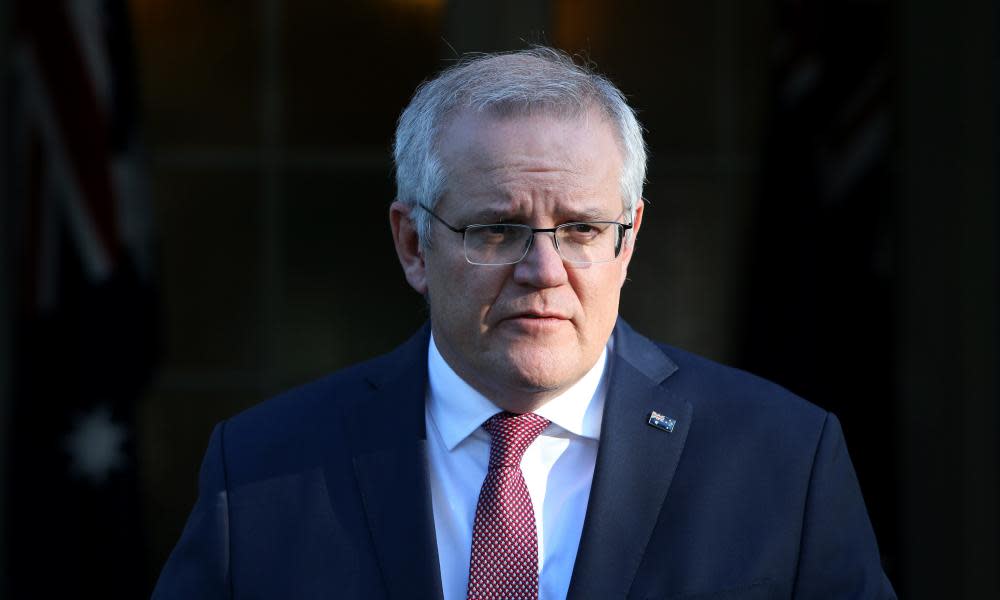Aukus row: EU officials demand apology from Australia over France’s treatment before trade talks

European Union officials are demanding answers – and an apology from Australia – over its treatment of France as the fallout from the Aukus announcement threatens to delay a key trade deal.
Australia’s hopes of entering into a free-trade agreement with the European Union hit rough waters with the EU Commission president, Ursula von der Leyen, demanding Australia explain its conduct in defence of EU member state France.
The Morrison government announced it was cancelling its $90bn submarine contract with the French and entering into a “forever partnership” with the United States and United Kingdom in a new agreement known as Aukus late last week.
The French claimed to have been “blindsided” by the announcement. Despite attempts to soothe the diplomatic row, the French recalled their ambassador and have asked the EU to reconsider Australia’s involvement in a free-trade deal with the EU.
While trade talks with Australia are expected to continue as planned, von der Leyen said Australia had some explaining to do first.
“One of our member states has been treated in a way that is not acceptable, so we want to know what happened and why,” von der Leyen said in an interview with CNN.
“Therefore, you first of all clarify that, before you keep on going with business as usual.”
The chair of the European Parliament’s committee on International Trade, Bernd Lange, continued that theme in an interview with the ABC on Tuesday.
“It is really an unkind situation France is faced with,” he said, adding that the he expected to see “some kind of apology, some kind of de-escalation of the situation, from the Australian government” to help for “better understanding”.
“The question of trust is now occurring, and some members could ask for more safety nets, for more safeguards,” he said.
European leaders will meet in New York to consider the response to the axing of the French deal in favour of the Aukus pact. The US president, Joe Biden, has asked for talks with the French president, Emmanuel Macron, in an attempt to mend relations. The French have agreed to a phone conversation in the coming days.
Related: France tries to delay EU-Australia trade deal amid Aukus fallout
Scott Morrison, who is in New York ahead of his first meeting with Biden, said there was “no opportunity at this time” for his own talks with Macron.
“I’m sure that opportunity will come in time,” he said from New York. “Right now I understand the disappointment and they’re working through the consultations with their ambassador’s return to Paris and we’ll be patient with that.”
Morrison said he took heart from European Commission foreign affairs head Josep Borrell’s comments to “not mix apples and pears” last week, when it came to Australia’s involvement in the EU free-trade agreement.
“I think that’s a pretty good summary of the situation,” he said.
“I mean, these issues will be worked through in the weeks and months ahead. It’s not an easy thing to do, to get an agreement with the European Union on trade, I think everyone understands that.”
The vice president of the European commission Josep Borrell met with foreign minister Marise Payne on Tuesday to discuss the situation. The official read out of the meeting made clear the EU’s concerns, questioning the “lack of prior consultations” with the French, while expressing “regret this partnership excludes European partners”.
The current challenges to stability in the region call for more cooperation and coordination among likeminded partners,” the official statement said.
“…The EU will reflect and discuss this internally, as well as with EU member states.”
I met with the Foreign Minister of Australia, @MarisePayne in the margins of #UNGA to discuss latest developments, including #AUKUS and the cancellation of the submarine contract with France, and EU-Australia relations.
Press release: https://t.co/g6Lb1qvPEB pic.twitter.com/6dnrET9NNn— Josep Borrell Fontelles (@JosepBorrellF) September 20, 2021
While French anger continues to simmer, Australia’s diplomats have been working overtime to reassure Australia’s partners in the Indo-Pacific the Aukus deal will not affect the region.
Morrison spoke with the Indonesian president, Joko Widodo, on his way to New York to “assure him of Indonesia’s key areas of interest” including that Australia would “maintain all of our obligations under the non-proliferation treaty and the nuclear non-proliferation regime” and that the Aukus agreement “would contribute to peace and stability and a strategic balance in the region”. Australia will send a team to Indonesia to issue further briefings on what the new strategic agreement will mean.
The phone call came on the back of the Australia’s ambassador to Asean sending a statement to south-east Asian nations reiterating Australia’s commitment to Asean goals, while reiterating Aukus was not “a defence alliance or pact”.
So far, the most positive response has come from the Philippines, which has welcomed the Aukus announcement on the grounds “the enhancement of a near abroad ally’s ability to project power should restore and keep the balance”.
“Asean member states…do not possess the military wherewithal to maintain peace and security in south-east Asia, discourage the sudden creation of crises therein and avoid disproportionate and hasty responses by rival great powers,” the statement from the nation’s secretary of foreign affairs, Teodoro Locsin Jr said.
“Preventative diplomacy and the rule of law do not stand alone in the maintenance of peace and security.”
Locsin said there was an “imbalance” in the forces available to Asean nations, something the Philippines believed the Aukus arrangement could help address.

 Yahoo News
Yahoo News 
